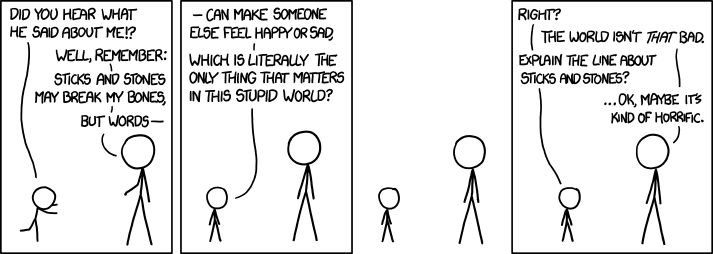These are just a few fairly random pieces of media that I’ve come across lately that open some paths to start talking about the power of words and the struggle to define them.
I haven’t made up my mind about this podcast as a whole yet but this one was interesting. The whole idea of virtual law for video games is interesting but it’s further improved by the idea that a lot of this based purely on words.
Online, multi-player games create addictive, all-encompassing competitive worlds for players. But sometimes, players disturb the fantasy with abusive behavior. Through trial and error, game developers have found that “virtual judiciaries” can help solve problems in their virtual worlds, and the results have real-world consequences.
This episode has a number of different interesting options but a huge part of the issue is around defining solitary confinement, torture, and cruel and unusual punishment.
In its code of ethics, the American Institute of Architects requires members to “uphold human rights.” But what does that mean when it comes to prisons—specificially, those that confine inmates largely to their cells with little to do?
Dear judges: Stop trying to figure out what the founders meant by every little word. You can’t, and it doesn’t matter.
To get at the original understanding of the text, the court started with the language, which normally trumps other evidence about the founders’ intentions. The court first argued that the language refers to the recess, not a recess. Thus, the founders could have had only one particular recess in mind, and that recess must be the one that takes place between the two sessions. Because Congress chose not to leave a gap between the 2011 session and the 2012 session, the recess could not have taken place.
Two of three judges sitting on the panel further argued that by providing for recess appointments only to vacancies “that may happen during the Recess,” the founders intended to limit appointments to vacancies that open up during the intersession recess. But the vacancies that Obama filled could not have opened up during an intersession recess because no such recess took place.
Both of these readings are possible; they may even be plausible. The administration’s argument—that the recess means any recess, and that the vacancies that happen during the recess are vacancies that exist during the recess—is also consistent with the language. But it’s strange to think that “the Recess” means only one (intersession) recess when, even under the court’s interpretation, there have been hundreds of intersession recesses—every year there was another intersession recess up until last year—and the founders surely expected numerous such recesses unless they believed that the republic would collapse in 1791. Indeed, the Constitution repeatedly refers to “the Congress” and “the President.” If the court’s interpretation of “the” as “the single” were correct, this would mean that the founders expected only one Congress and one president to ever come into existence, when in fact (as other language makes clear) they contemplated numerous Congresses (one every two years) and numerous presidents as well.
But here’s the point. It defies belief that the founders intended to constrain recess appointments by using the word the rather than a, or by using the word happen rather than exist. If the founders had feared that the president would abuse the recess appointments power in order to create a tyranny, they would have made their intentions to constrain the president a bit more explicit.From this older post about word choice and gender in ads for boys and girls toys. It’d make for an interesting project for other media as well.


